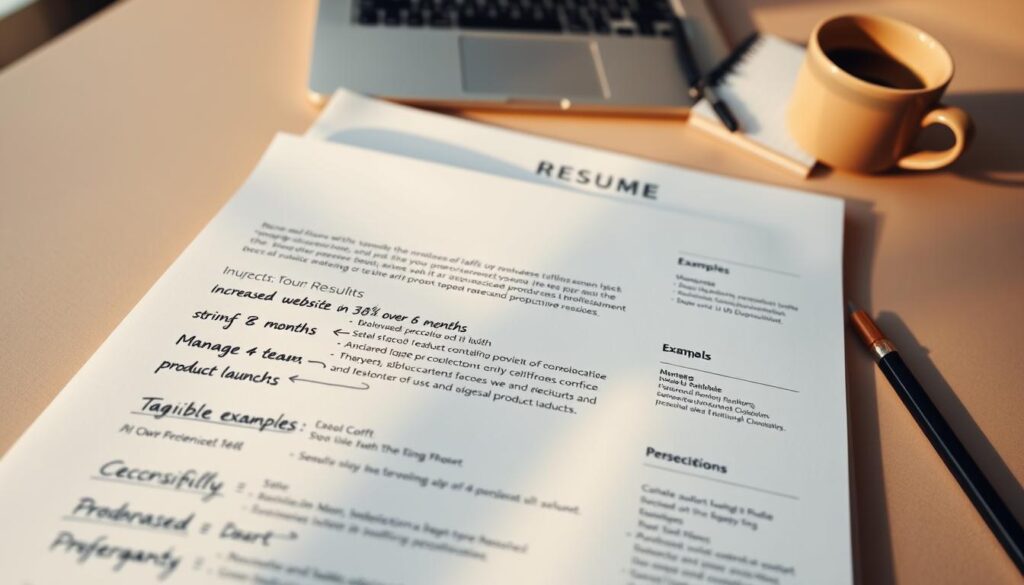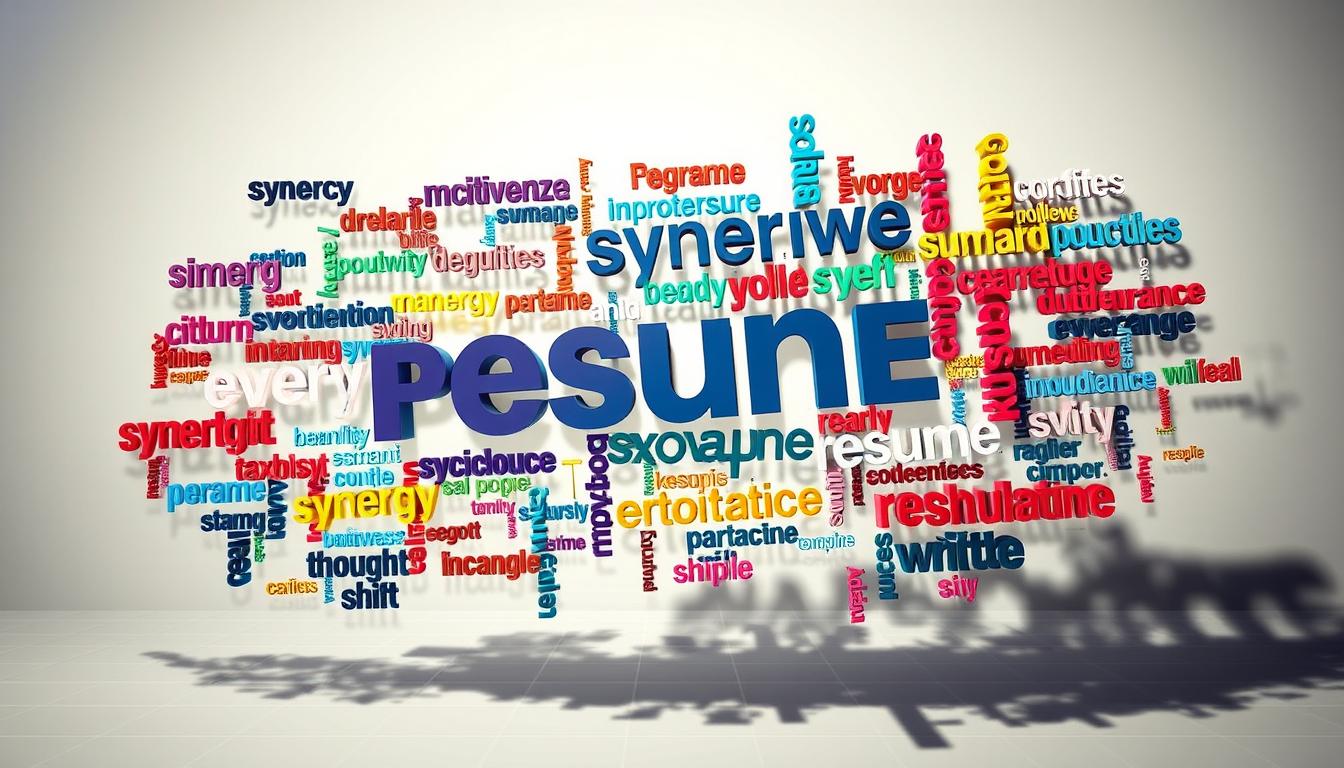78% of hiring managers automatically dismiss applications that use three or more generic phrases like “team player” or “hard worker.” These terms have become so overused they now signal a lack of originality, not competence. In 2025, job seekers face a critical choice: replace empty jargon with evidence or risk getting filtered out before human eyes ever see their qualifications.
This guide reveals the 14 most damaging clichés haunting modern applications. You’ll learn why terms like “quick learner” fail to impress recruiters and discover specific, measurable alternatives that prove your value. For example, instead of claiming to be a “problem solver,” showcase how you reduced customer complaints by 40% in six months using targeted process improvements.
Tools like RoboApply’s AI-powered platform analyze your document’s language in real-time, flagging tired phrases and suggesting ATS-friendly replacements. Their database of sales resume examples demonstrates how to transform vague claims into compelling narratives backed by data.
Key Takeaways
- Generic terms like “people person” now hurt applications more than they help
- 73% of recruiters spend under 10 seconds scanning each document
- Effective resumes use metrics and context instead of adjectives
- AI tools can identify 92% of common clichés instantly
- Actionable alternatives exist for every overused phrase
Understanding Resume Buzzwords: Their Role and Purpose
Job documents once thrived on phrases like “synergy” and “outside-the-box thinking.” Today, these terms act like invisible ink—present but unnoticed. The difference between attention-grabbing language and forgettable filler lies in strategic word choice.
Defining Buzzwords Versus Keywords
Strategic keywords prove your qualifications. “Python proficiency” or “CRM optimization” show specific skills employers value. Empty buzzwords like “dynamic professional” lack proof. Applicant tracking systems (ATS) scan for industry-specific terms but filter out vague claims.
The Evolution of Resume Language
Terms that impressed in 2005 now raise red flags. “Detail-oriented” appeared on 63% of documents last year, according to career experts. Modern hiring teams prioritize measurable results over personality traits. Instead of stating “excellent communicator,” describe how you trained 15 staff members on new protocols.
Pro tip: Run your document through AI tools to spot outdated terms. Focus on verbs like “engineered” or “streamlined” that connect skills to outcomes. This approach keeps your application relevant in 2025’s competitive market.
Recognizing the Pitfalls: Why Overused Terms Fail
Generic language acts like static in a job search—it drowns out your unique value. When recruiters spot familiar phrases like “results-driven” or “self-starter,” they’re not impressed. They’re mentally checking out.

The Hidden Costs of Common Phrases
Overused terms tell employers you’re copying templates rather than showcasing achievements. A study by TalentBoard found 68% of hiring managers view cliché-heavy documents as lacking effort. Instead of proving your skills, these phrases raise doubts about your attention to detail.
Consider this: Stating “excellent communication skills” wastes space that could detail how you negotiated vendor contracts saving $12K annually. Specificity cuts through the noise. Common pitfalls like vague adjectives also prevent ATS systems from detecting relevant keywords, further reducing visibility.
Clichés create another problem—they make you forgettable. When five candidates all claim to be “passionate innovators,” recruiters struggle to differentiate them. One tech hiring manager admits: “I skip summaries filled with fluff and jump straight to measurable results.”
To stand out, replace empty claims with context. Instead of “team player,” describe how you led a cross-departmental initiative reducing project delays by 25%. Tools like RoboApply’s headline analyzer help identify weak language while suggesting data-driven alternatives.
Resume Buzzwords, Avoid: Common Clichés and Weak Verbs
Generic descriptors act like fog in a job search—they obscure your true capabilities. Modern hiring teams dismiss claims like “self-motivated” because they reveal nothing about your actual impact.
Personality Traits and Generic Claims to Eliminate
Statements like “detail-oriented” or “results-driven” fail because they’re unprovable. A CareerBuilder survey found 62% of managers view these terms as meaningless filler. Instead of claiming to be a “team player,” show how you collaborated on a project that boosted departmental efficiency by 18%.
Weak example: “Hard worker with excellent communication skills”
Improved version: “Reduced client response time by 35% through streamlined email protocols”
Outdated Action Verbs and Passive Phrases
Terms like “helped” or “assisted” dilute your contributions. Compare these approaches:
- “Responsible for customer service” → “Resolved 90+ weekly client inquiries with 98% satisfaction rate”
- “Participated in team meetings” → “Led weekly strategy sessions that reduced project bottlenecks by 22%”
Passive language signals indecisiveness. Tools like RoboApply’s keyword analyzer identify weak verbs and suggest targeted action verbs that align with job descriptions. Replace “familiar with” with “implemented” or “optimized” to demonstrate hands-on experience.
Outdated phrase: “Duties included data entry”
Modern alternative: “Automated 200+ monthly reports using Excel macros, saving 15 work hours weekly”
Effective Alternatives: Using Metrics and Specific Examples
Numbers cut through recruiter skepticism faster than any adjective. A sales growth figure proves value where “results-driven” only hints at capability. This approach turns your document into a portfolio of verifiable successes.

Replacing Generic Terms with Impactful Language
Transform “managed projects” into “spearheaded 12 cross-functional initiatives delivering $1.2M in annual savings.” Notice how verbs like spearheaded and specific quantities create immediate credibility. For customer service roles:
Weak: “Provided excellent support”
Strong: “Resolved 94% of tier-2 escalations within 4 hours through optimized troubleshooting protocols”
Quantify challenges you’ve overcome. Instead of claiming “problem-solving skills,” describe how you identified a 20% inventory discrepancy trend and implemented tracking systems that reduced errors by 65% in Q3. Tools like SweetCV’s power word guide help find industry-specific terms that demonstrate expertise without clichés.
Prioritize outcomes over duties. “Increased social media engagement” becomes “Grew Instagram followers by 220% in 6 months through targeted reels strategy.” These specific examples give hiring teams concrete reasons to advance your application.
Tailoring Your Resume With Targeted Keywords and Achievements
Customizing your document for each role isn’t optional—it’s essential. Hiring teams now expect precise alignment between your experience and their needs. Start by dissecting job descriptions like a roadmap to identify must-have technical skills and industry-specific terms.
Backing Up Claims with Measurable Results
Every claim needs proof. Instead of listing “leadership skills,” show how you mentored 8 junior staff members who earned promotions within six months. Tools like RoboApply’s ATS scanner highlight gaps between your keywords and the employer’s priorities, ensuring you speak their language.
Follow this three-step process:
- Extract 5-7 core requirements from the job posting
- Match each to a specific achievement using numbers
- Use active verbs like “accelerated” or “optimized”
For example, if a role requires CRM expertise, write: “Boosted sales pipeline visibility by 30% through Salesforce dashboard redesign.” This approach works for any industry—see how project manager roles require different metrics than marketing positions.
RoboApply’s achievements builder helps quantify your impact. Input your experience, and it suggests phrases like “Reduced client onboarding time from 14 days to 9 using automated workflows.” Pair this with our guide to targeted resume strategies for maximum effect.
Remember: Specificity beats generality every time. Hiring managers remember candidates who demonstrate exactly how they’ll solve problems, not those hiding behind overused terms.
Leveraging RoboApply for a Competitive Resume
Modern job tools transform vague claims into career opportunities. RoboApply’s AI-powered platform streamlines every step of your search—from drafting documents to negotiating offers. Unlike basic templates, it analyzes your unique strengths and tailors content to match employer priorities.

Utilizing the AI Resume and Cover Letter Builder
The platform’s AI builder scans your draft in real-time, flagging phrases like “hard worker” and suggesting alternatives like “cut client onboarding time by 18 days.” Its grammar checker identifies passive voice and weak verbs, pushing you to use action-oriented language. For entry-level IT roles, it might recommend replacing “tech-savvy” with “automated 30+ weekly reports using Python scripts.”
Create matching cover letters in minutes. The tool cross-references your resume with job descriptions, ensuring consistent keywords and tone. One user reported landing interviews 3x faster after the AI highlighted missing industry-specific terms in their application.
ATS Optimization, Auto-Apply, and Interview Coaching Features
RoboApply’s ATS scanner checks font compatibility, header structure, and keyword density. It automatically adjusts your document to pass automated screenings while maintaining readability. The Chrome extension submits applications directly from job boards, saving hours weekly.
Post-application, the CRM tracks responses and reminds you to follow up with hiring managers. Before interviews, the AI coach analyzes common questions and helps articulate achievements without buzzwords. As one CV tool review noted: “Candidates using these features consistently rank higher in recruiter evaluations.”
Crafting Impactful Resume Sections for Maximum Engagement
Your professional summary and work experience sections act as career highlights – they need precision, not platitudes. Hiring teams want proof of expertise, not recycled phrases from common resume pitfalls. Start by replacing “dedicated professional” with statements like “Marketing director who increased organic traffic 180% in 12 months.”
Building Evidence-Based Career Narratives
Structure your experience section using the CAR method: Context, Action, Result. Instead of “managed social media,” write: “Revitalized stagnant Instagram account (context) by implementing daily reels strategy (action), growing followers from 800 to 2,500 in 4 months (result).” This approach works for all roles – see how lifeguard resumes quantify water safety training hours.
For summaries, focus on unique value: “IT specialist who reduced system downtime 45% through preventive maintenance protocols” beats “tech-savvy problem solver.” Use active verbs like streamlined or optimized to connect skills to outcomes. Every claim should answer: “How did this help your employer?”
FAQ
What’s the difference between buzzwords and keywords?
Buzzwords are vague terms like “team player” that lack evidence, while keywords are specific skills or tools directly tied to job descriptions (e.g., “Python” or “CRM optimization”). Use keywords to pass ATS filters and show relevance.
Why do clichés weaken my application?
Overused phrases like “detail-oriented” fail to demonstrate your unique value. Hiring managers see them as filler content—they want measurable achievements instead, such as “boosted client retention by 22%.”
What are examples of outdated action verbs?
Avoid passive terms like “managed” or “responsible for.” Replace them with dynamic verbs such as “spearheaded,” “engineered,” or “streamlined.” Pair these with quantifiable outcomes: “Streamlined payroll processing, cutting errors by 40%.”
How can I use metrics effectively?
Attach numbers to your achievements to show impact. Instead of “improved sales,” write “Increased Q3 sales by 15% through targeted email campaigns.” Metrics make your contributions tangible and credible.
How do I tailor my resume with keywords?
Study the job description for repeated terms like “project management” or “SEO analytics.” Mirror this language in your skills and experience sections. For example, replace “good communicator” with “negotiated vendor contracts worth 0K+.”
What tools can help optimize my resume?
Platforms like RoboApply use AI to align your resume with job requirements, auto-apply to roles, and coach you for interviews. Their ATS optimization ensures your document highlights critical keywords and achievements.
How do I avoid buzzwords in my summary?
Focus on unique value: “Certified Scrum Master with 8+ years leading SaaS dev teams” beats “dynamic professional.” Highlight certifications, niche skills, or industry-specific results to stand out immediately.
Should I include soft skills at all?
Yes, but prove them. Instead of “strong leadership,” write “Mentored 5 junior analysts, improving report accuracy by 30%.” Use concrete examples to demonstrate traits like collaboration or problem-solving.
What’s an alternative to “team player”?
Show collaboration through outcomes: “Collaborated with cross-functional teams to launch 3 product features ahead of deadline.” Specify roles and results to illustrate how you contribute to group success.
How do I handle passive phrases?
Rewrite sentences to start with action verbs. Change “Was responsible for social media” to “Developed viral social campaigns driving 10K+ monthly engagements.” Active language emphasizes ownership and initiative.


















